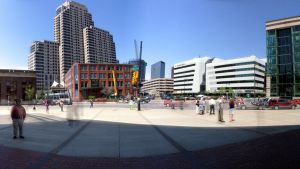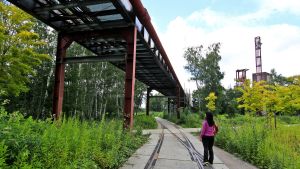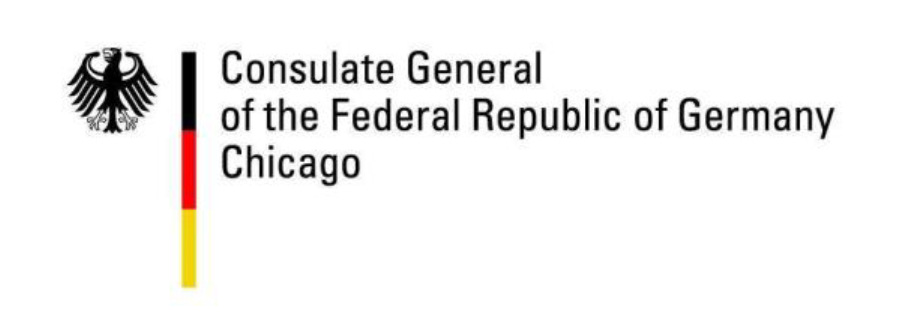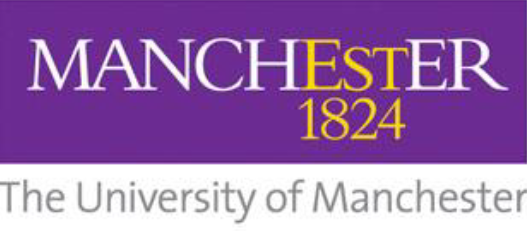Transforming Industrial Regions of North America and Europe: Opportunity and Imperative

This report summarizes the Transforming Industrial Regions of North America and Europe symposium, including strategies to rebuild economies and stem anti-democratic populism.
Introduction
This report collects insights and findings from the virtual Transforming Industrial Regions of North America and Europe symposium on May 11 and 12, 2021. The symposium explored the causes and challenges posed to democracies from populist movements, the links between economic conditions and populist sentiments, and effective policies and practices for economic transition in struggling industrial regions.
Hosted by the Chicago Council on Global Affairs and its partner organizations—Georgetown University’s BMW Center for German and European Studies, the Michigan Economic Center, Policy@Manchester at the University of Manchester, and the Consulate General of the Federal Republic of Germany in Chicago—the symposium convened more than 100 federal, state, and local leaders; policymakers; and economy-building practitioners from Europe and North America to discuss these issues.
Participants traded notes, shared experiences, and underscored the urgency of implementing policies, practices, and strategies that facilitate economic development and create new opportunities for residents of older industrial regions—with the goal of addressing a fundamental cause of the strain of populism that is threatening Western democracies, polarizing politics, and undermining the transatlantic alliance.
The Challenge of Economic Transition and Populism
Why We Care
As Rachel Wolf, founding partner of Public First, told symposium participants:
The reason we care so much about . . . these regions is fundamentally because we are very worried about politics. We are worried that across the developed world there are seismic changes happening in the kinds of politicians that are voted for, the kinds of parties that are voted for, and what that means for everything from transatlantic trade policy, tariffs, the principles of globalization and free markets, down to national immigration policy [. . .] and the degree to which we’re able to take action on climate change, as well as broad economic policy.
As we have observed in recent years, such polarized politics at home threatens the health of transatlantic cooperation—and our democracies themselves.
The two-day symposium confirmed the central role of economic conditions in driving support for antidemocratic populism. Such support thrives as geographic economic disparities and opportunity gaps grow, particularly disparities between thriving global-city regions and communities in industrial heartlands.
Older industrial communities are geopolitically significant places where many residents feel ignored, looked down on, and patronized by national politicians.
Roland Lescure, chairman of the Economic Affairs Committee of the French National Assembly, speaks on the sentiments behind recent populist movements in France.
Residents’ economic anxieties, concerns about losing their place in a changing world, and perceptions of community decline can increase the appeal of populist messages of nativism, nationalism, isolationism, and economic nostalgia.
Mark Speich, State Secretary of North Rhine-Westphalia, Germany, talks about the relationship between economic structural change, cultural and social change, and populism.
Those on both the left and the right are capable of fanning the flames of these populist movements and the accompanying polarization.
Rachel Wolf interprets characteristics of left-wing and right-wing populism.
But as populism scholar Cas Mudde told the group, it is the right-wing variant that encourages antidemocratic behavior and distrust of institutions and the press, leading to a breakdown in support for the civil rights of others and nurturing a fierce political polarization that undermines democracies.
The urgent need to find a successful, unifying political path forward is compounded by the fact that democracies face new challenges. For example, an emerging China and a revisionist Russia seek to weaken the open, rules-based economic and political system—and democracy itself—with an authoritarian model.
In a competition between democracy and authoritarianism in a multipolar world, our own democracies must strengthen themselves and work together to check the bad behavior of China and other state actors.
Peter Beyer, coordinator of transatlantic cooperation with the Federal Foreign Office of Germany, advocates for the removal of barriers to transatlantic fair trade.
We must also offer a compelling alternative model to the authoritarianism of China and others to demonstrate that functional democracies deliver greater freedom and more economic opportunity and security.
Martin van der Pütten of the Office for International Relations in Dortmund, Germany, says a new urban diplomacy is emerging.
But even as many of the root causes of these populist movements are economic, the solutions are inherently political.
Leaders who want to address these root causes must win elections and then empower industrial communities to shape their own unique paths to a brighter economic future while providing the resources and support necessary to get there.
The good news is that there is a middle path that can bring people together and capture elections.
Rachel Wolf outlines a moderate agenda with broad appeal.
But as the symposium made clear, knowing how to begin is imperative.

Milwaukee's River Walk was a large part of the city's downtown revitalization project.

The city of Grand Rapids, Michigan, has undergone many revitalization efforts in its downtown area within the past 10 years.
What We Learned
The two-day event proposed new approaches, including how to effectively communicate with residents of struggling economic regions and how to support them in invigorating local and regional economies.
To effectively aid struggling communities, leaders must first see things as residents do: the hollowing out of communities; the loss of local schools and sports leagues; degraded main and high streets; and lost cultural facilities, union halls, local papers, family-owned shops, taverns, and restaurants.
As UK MP Lisa Nandy noted, the loss of opportunity and the decline of institutions that build and reinforce civic pride leads to a loss of a sense of identity.
A first step on the path to a new sense of optimism is ensuring that national and federal leaders understand these issues, and then providing the resources to mend the tears in the economic and social fabric of communities.
Congresswoman Cheri Bustos explains her approach to understanding constituents’ lives and needs.
In cities and towns that still struggle economically, leadership that focuses on the people, and pays attention to their tangible and immediate needs, can build “permission” to be heard on larger things.
Rachel Wolf outlines how to create momentum for economic investment and change.
To be effective, leaders must bring the resources and external investments needed to implement solutions. If done well, this can create trust between communities and national leaders—trust that will nurture support and acceptance of additional investments that can move their economies forward in more substantive ways, such as with larger-scale investments in people, infrastructure, skills, and innovation.
But as Mayor Thomas Westphal of Dortmund, Germany, argued, the plan for economic evolution has to come from within. It must be specific to each community and owned and operated by community residents and leaders.
Change cannot be “done to” a community or perceived to be coming from others, even if the change is backed by good intentions. From West Germany coming in to the former East to rebuild its economy, to the European Union telling Central European communities they must go green, to Washington pundits offering “solutions” for heartland people and places, such efforts have the unintended consequence of triggering negativity and resentment and reminding industrial-community residents of their loss of control.
Thomas Kralinski, former state secretary of Brandenburg, details how top-down policies spurred populism in East Germany.
Solutions have to come from the people. From Milwaukee, Wisconsin, to Sheffield, United Kingdom, to Windsor, Ontario, to the communities of Germany’s Ruhr valley, the transformational strategies that have enabled industrial regions to find new footing in a globalized, technology-driven knowledge economy have come from within.
Comments from the Symposium Chat
Sustainable transformation needs capacity building with residents and the active engagement of civil society, including young and more senior perspectives. Only all together we can change narratives and take it out of the hands of populists. The alternative is quite dark, as we can witness from many parts of eastern Germany, despite signs of economic revival. Sociocultural factors must be actively thought through together with economic considerations and discussed and developed with residents.
A hopeful new future for industrial communities can be built by embracing their historical identities and building from them. Residents in these heartland industrial communities are proud of their legacies of making things and contributing to their nation’s economic and political success.
Birgit Klohs talks about how Grand Rapids, Michigan, built on past successes to grow its economy.
Richard Jones of the University of Manchester discusses the use of local identity as the basis for long-term planning in Sheffield.
And in communities whose economic identity was lost—as in Pittsburgh, the former Steel City, or Manchester, once the world’s textile capital, or Dortmund, a former coal and steel capital—community members must confront this reality, identify their community’s strengths, and envision a new future.
Don Carter of Carnegie Mellon University describes the collapse of steel in Pittsburgh in the late 1970s and early 1980s, and the beginning of a rebirth.
Perhaps the most important thing leaders can do to empower these industrial regions’ new success and optimism is to refrain from talking down to residents, patronizing them, or viewing them with pity.
Rachel Wolf says it’s important for leaders and policymakers to avoid condescension.
Residents don’t like being called “left behind” (in the United States) or in need of “leveling up” (in the United Kingdom). They do not consider themselves “postindustrial,” living in “Rust Belts,” or in need of “restructuring.”
Comments from the Symposium Chat
When we say, 'People feel like they are being talked down to,' we're centering ourselves as elites and reinforcing why people are reacting to 'being talked down to.' We need to ask, 'Why do we keep talking down to people, and how do we change what we’re doing?' That simple reframing could deliver enormous returns on the goals we're claiming we all share.
Instead, wrote Iowa farmer Matt Russell in a symposium chat comment, what residents should hear from their leaders is: “We see you. We understand why you are upset with the conditions of your community. You and your community and future success is a national priority. We are here to support and offer resources for you to build your own future.”
Understanding Populism and Place
To open the symposium, several leading scholars discussed the meaning of populism, the historical significance of the present moment, and the relationship of this political phenomenon to geographical place.
Cas Mudde of the University of Georgia laid out a broad conceptual framework for the discussion. He offered a definition of populism and traced its history and impact.
As Mudde argued, populism is nothing new, but the current wave of populism since the Great Recession is distinctive in that it is virulent, widespread, and concentrated primarily in the far-right wing of the political spectrum. The current populist wave poses a particularly worrisome threat to liberal democracy around the world, in that today’s populist leaders ascend to power via majoritarian democratic means but then quickly begin to undermine many of liberal democracy’s core features: the rule of law, minority rights, and the separation of powers.
As Mudde argued, populism and place are strongly connected.
Katherine Cramer of the University of Wisconsin–Madison echoed these themes, drawing from her research on attitudes, values, and resentments among rural residents of Wisconsin.
Stephen Weymouth of Georgetown University continued the discussion on populism, speaking to two key questions: What explains the emergence of the current populist wave, and why has that wave come overwhelmingly from the right wing?
As Weymouth noted, economic geography is an important part of the answer to both questions.
Technological developments are producing diverging spatial patterns of economic development in the United States and elsewhere. The globalization of production, the spread of automation, and the increasing ability to trade services (not just goods) globally have led to growing regional disparities in economic structure, performance, and prosperity.1
Meanwhile, Weymouth noted, the growing high-tech and knowledge-driven services industries increasingly cluster in what are often labeled “superstar cities.” Technological change over the past several decades has led to differences in economic performance between rural and thriving urban areas, and these differences in economic performance have exacerbated the cultural tensions that have fueled the populist revival.
- 1
See, for example, Richard Florida, The New Urban Crisis: How Cities Are Increasing Inequality (New York: Basic Books, 2017).
Comments from the Symposium Chat
Another obstacle to a better politics would seem to be economic. We spoke about the forces of economic agglomeration, driven in part by globalization. How successful can regional economic strategies and investments be in the face of these trends? If you are not a megacity or able to become one, can you still thrive in a globalized economy?
Answers to Weymouth’s second question—why current populist movements mainly emerge from the right wing—relate to the decline of manufacturing in formerly industrial regions. That decline, combined with the United States’ deep-rooted, painful history of racism, creates a perceived status threat to white populations in certain parts of the country. Drawing on social-identity theory, Weymouth argued that this perceived threat draws white residents in those areas to populist candidates such as former President Donald Trump who promise a nationalist industrial revival and who signal sympathy for the status concerns of white voters.
Pauliina Patana of Harvard’s Kennedy School of Government drew on her research on France and Finland to highlight the emergence of sharp regional disparities in growth and prosperity. These disparities, she said, create divergences in important aspects of community conditions such as housing affordability and residential mobility, which in turn reshape political geography.
In thriving urban areas, the rising cost of housing has made city living unaffordable for people in other parts of the country, creating barriers to moving to where the jobs are.
At the same time, residents on the economic periphery face the other side of the housing coin—they live in stagnating areas where the housing market is depressed and the value of individual homes is declining. These challenges compound the difficulty of relocating from these regions and cities in search of upward mobility.
Feeling locked into a place fuels a sense of hopelessness and resentment, creating opportunities for populist candidates to garner support in key geographies. People prefer to see their communities as they once were.
Lisa Nandy says the losses of younger populations have profound implications for communities.
But residents who cannot exit because they are boxed out of more expensive communities—or who decide not to leave—voice their frustration at the ballot box. Right-wing populist parties actively amplify these residential issues, while mainstream parties often exacerbate these dynamics by focusing their attention on issues that are important to wealthier urban voters rather than on issues such as affordable housing.
Tony Pipa, senior fellow in the Center for Sustainable Development at the Brookings Institution, says the United States lacks a coherent set of policies for rural America.
Another challenge, argued UW-Madison’s Cramer, is that solutions to support social mobility—even obvious ones such as improved education and skill levels—have become wrapped up in identity politics. Perceptions of educational needs are very closely intertwined with the cultural-political divide generated by the populist challenge.
For example, higher education is increasingly associated with urban, left-leaning elites, while struggling communities place more emphasis on practical solutions such as job training and technical college. At the end of the day, the two sides are talking past one another.
Making Change
What Works
The discussion at the symposium led to rich insights about how to accelerate economic transition in similarly situated regions, and about the varied tactics and strategies that work.
The following strategic guidance and overarching principles for creating economic transformation emerged in sessions with mayors, local and regional leadership, and economic development practitioners.
1. Let change come from the people
Leaders of effective change strategies consistently reinforced the importance of civic and community engagement.
Thomas Westphal outlines how to build a bottom-up plan for economic transformation.
Julia Taylor says leaders have to build trust.
Manchester Mayor Andy Burnham covers the appeal of locally rooted solutions.
As Rachel Wolf argued, leaders who listen to their communities and stay in touch with their needs get permission to do more.
2. Implement coupled, holistic, and integrated strategies
Many economic change practitioners discussed the importance of coupling strategies between organizations and institutions such as businesses, universities, and governments. Effective strategic change in communities works across community domains, and works from the bottom up and the top down.
Peter Berkowitz of the European Commission notes the challenge of inclusive growth in knowledge-driven economic development.
Grant Ervin notes the importance of bringing different institutional interests and voices together.
Katje Witte, Wuppertal Institute, explains how structural change must be specific to place and holistic.
As Birgit Klohs noted, the holistic approach needs to be inclusive, both in terms of people and across geographies.
Comments from the Symposium Chat
There is a lot of fragmentation and multiple layers of government in the EU combined with pretty strong restrictions on financial autonomy, particularly in relation to borrowing. There are a lot of historical ties between different regions in Europe. Increasingly, faced with public-sector reform there are incentives for cooperation. So this creates a more favorable environment for cooperation. What is interesting is that there [is] quite a strong demand from regional and local authorities for support at the EU level to support cooperation; for example, in the areas of research and industrial development. One really interesting instrument that we have just launched is a fund to support complementarities between regions in specific technologies so that firms can share demonstrator facilities and pilot lines. This can be particularly important for peripheral cities and regions. I wonder if such an approach would work in the more competitive US environment.
3. Fashion a new story of hope
Residents need to believe in a future for themselves and their communities. One of the functions of community leaders is to engage with their constituents and help to construct a new, affirmative narrative based on who they are and where they are going.
Grant Ervin on the power of a positive vision.
Michael Vassiliadis, President of IG Bergbau, Chemie, u. Energie, says codetermination can create a hopeful vision for the future.
4. Build on who you are
Residents don’t want to feel that they can’t take pride in their community or that their hard work is being belittled by outsiders. External efforts to create a new community identity or the application of labels such as “postindustrial” can build resentment. Rather, effective change agents and agency come from building on the legacies of the past—the pride and competencies forged by leadership in the industrial economy—and adapting this identity to a new economy.
Mayor Tom Barrett of Milwaukee describes how the city’s history as “the machine shop of the world” gave it strength in engineering and technical professions.
Mayor Andy Burnham explains how Manchester builds on its past to tackle the digital economy and decarbonization.
5. Work on demand and supply
Economic-development practitioners note the importance of talent, education, and skill building, and creating an environment and conditions in communities that both attract newcomers and keep local talent. But equally important is nurturing the creation of new businesses and jobs that pay well.
Peter Berkowitz of the European Commission shares lessons on creating new jobs and businesses.
Mayor Jeff Lehman of Barrie, Ontario, argues that policymakers should focus on careers, not jobs.
6. Build public-private partnerships
Successful community transition efforts demand effective public- and private-sector collaborations, in which business, labor, government, and nongovernmental organizations share the same strategy.
Mayor Rosalynn Bliss of Grand Rapids, Michigan, describes how her city’s history of public-private collaboration helped reverse decline.
7. Borrow success and make your own version
Many successful economic change leaders adopt ideas and strategies from other communities and adapt them to meet their own needs.
Julia Taylor, Greater Milwaukee Committee, speaks on the benefits of sharing and stealing good ideas.
Former Grand Rapids, Michigan, Mayor George Heartwell says mayors are great “idea thieves.”
8. Provide the necessary resources
Policies that respond to a degraded social fabric and the loss of community institutions, and which afford the education, skill-development, innovation, and commercialization of new products and services that support good-paying jobs—all take significant resources. Economic changemakers emphasized the nature and the scale needed to manage effective change.
Peter Berkowitz of the European Commission discusses the need to create capacity for change.
Former Mayor Frank Baranowski of Gelsenkirchen describes what happens without sufficient resources.
9. Think beyond the traditional economic development tool kit
Just as successful communities managing economic transformation strive to evolve their existing economies and business bases, practitioners of economic development say there’s a need to adapt the thinking, strategies, and traditional tools of economic development in light of new forces that affect the work of economic development.
Peter Berkowitz proposes that traditional economic development policies must adapt to today’s challenges.
Evolving those strategies means rethinking traditional economic development tools—such as tax breaks and other giveaways that may not work.
Comments from the Symposium Chat
Would be good to create a rubric or framework for accountability that represents the intersectional elements essential to today’s progress . . . defined by equitable development/sustainable development. With that, enhanced diversity at the table will make us all the more able.
Paths to New Economic Success
Local communities and regions in the process of structural economic change can leverage their assets to create economic success in today’s changed economy.
As detailed in the 2020 Chicago Council on Global Affairs report A Vital Midwest and the symposium background paper Paths to New Prosperity in Industrial Regions of the West, industrial regions on both sides of the Atlantic are developing a variety of paths to find new economic purchase in a changed world.
While many of these communities share similar economic development patterns, some choose to integrate a number of strategies as part of their transformation effort, while others lean in to one or two powerful levers to drive economic change. The symposium and the recent reports highlighted several pathways to community economic success, including the following:
Innovation and Universities
Many communities lean on colleges, universities, and other research and education institutions as powerful engines of skill building, innovation, and community development.
Peter Berkowitz outlines the role of universities in place-based strategies.
Global Engagement
Several economic development leaders stressed the economic payoffs of their communities’ global engagement, trade, and growing partnerships with the world.
Jay Byers, CEO of the Greater Des Moines Partnership, breaks down how global engagement benefits local communities.
'Green' and 'Blue' Economy Building
As communities seek to evolve their focus from the industries that powered the previous century to the sectors that are fueling today’s economy, many are rebooting their existing economic bases for leadership in the “green” and “blue” sectors and sustainable industries of tomorrow.
Mayor Thomas Kufen, Essen, Germany, speaks on transitioning from a coal city to a green city.

Rows of solar panels in Lincoln, Nebraska. Solar panels are an example of green energy.

A repurposed green walkway in Essen, Germany. The city won the "Greenest City in Europe" title in 2017.
Advanced Manufacturing
Industrial regions and communities have rich manufacturing histories, but today’s efforts focus on evolving leadership in advanced manufacturing, often referred to as manufacturing 4.0.
Mayor Jeff Lehman of Barrie, Ontario, points to local advantages in advanced manufacturing.
Place-Based Assets
Other industrial regions start by building on their own unique attributes of place, including natural, historical, and cultural assets and institutions.
Mayor Rosalynn Bliss of Grand Rapids, Michigan describes the importance of creating community conditions to keep residents and attract newcomers.
Talent
Many industrial communities have found promising pathways to success by attracting new talent and tapping the workforce skills of the entire population.
Jeff Lehman says building talent can be an anti-populism strategy.
Welcoming Immigrants
Other communities look to welcome immigrants as a powerful vector in driving population growth, entrepreneurship, and innovation.
Steve Tobocman, executive director of Global Detroit, highlights immigrants’ contributions to economic revitalization.
Sarah Wayland explains why welcoming immigrants should not be viewed as a “humanitarian project.”
Integrated, Multifaceted Strategies
Other communities animate more multifaceted economic development plans, where a combination of strategies and elements have turned the tide of decline and nurtured a new era of economic vitality.
Tim Bartik, senior economist at the Upjohn Institute in Kalamazoo, Michigan, explains how partnerships helped revive Kalamazoo.
Comments from the Symposium Chat
Lessons learned in remaking industrial regions:
It takes time.
The scale is metropolitan.
You need a long-term vision.
Diversify the economy.
Be bold, take risks.
You can’t do it alone.
Leadership is important.
Citizen engagement is also important.
Strengthen the central city.
Invest in culture, heritage, and quality of life.
Invest in education.
Develop equitably and sustainably.
Good planning and urban design matter.
Where We Go from Here
There is an urgent need for local, regional, and national governments across Europe and North America to come together and address the challenges posed by deindustrialization and technological change that is driving political discontent.
It must become a national priority to work across borders and help renew regional economies in industrial heartland communities.
Mayor Andy Burnham of Manchester argues for reducing the focus on London and correcting regional imbalances.
The prosperity of these regions affects not only the lives of residents but also the health of democracies. Governments at all levels must support these communities and regions in developing and implementing winning strategies that draw on the best ideas to build new economic success—by forming new transatlantic networks, sharing best practices, and nurturing effective, homegrown solutions and strategies.
As the symposium made clear, the pathways forward must not be imposed by leaders. They must be built from the ground up, empowering and supporting community residents, businesses, political leaders, and local institutions. We must embrace these challenges as our collective challenge. Only then will we see more good jobs, growing firms, vibrant downtowns, high standards in healthcare and education, and modern infrastructure linking these regions to one another and to the rest of the world.
The alternative leads to problems for us all: Disconnection. Resentment and anger. Economic decline. A lack of opportunity for residents and their families. A loss of optimism about the future. A sense that others do not understand or care, or that certain people and places do not matter as much as others. Unchecked, these feelings of discontent become fertile ground for division, distrust, and disaffection. When people and places feel ignored or disrespected, entire democracies and economies are weakened and threatened.
This is an urgent issue on both sides of the Atlantic. As a critical step to advance this work, the symposium organizers have joined with other interested partners in an ongoing transnational initiative and learning program aimed at animating policies, practices, and strategies that accelerate economic transformation in these industrial regions.
The goals of this initiative include the following:
- Focus leaders’ attention and actions on the need for enhanced place-based economic development that supports residents of communities in economic transition.
- Place this priority on the agendas of appropriate transatlantic meetings and dialogues involving the United States, Canada, the European Union, and the United Kingdom.
- Continue to build a network of transatlantic interlocutors including local and federal leaders, researchers and policy analysts, and practitioners of economic structural adjustment and change committed to this priority and the work of sharing ideas, models, policies, and lessons around driving economic transformation.
- Strengthen transatlantic collaboration and, in so doing, our democracies.
Conclusion
Leaders of democracies face the critical task of attacking the root causes of right-wing populism, economic anxiety, and the relative decline of particular communities and geographies. Unless local and federal leaders focus on and support economic success in places where residents feel alienated and not in control of their lives, these citizens will continue to fuel a polarizing populist politics that undermines our democracies.
Out of the shattering experience of World War II, the United States and Europe took action to bolster liberal democracies and market economies across the transatlantic space by creating the Marshall Plan and the European Economic Community. Now we must rise to a new political, economic, and social challenge, one rooted in growing regional inequalities that threaten democracy and the broader international order. We must create mechanisms that will permit us to build models and successes, share them with leaders on the ground, and support communities in animating and implementing their own paths forward. Rebuilding the confidence and capacity of these communities will enable them to play their full part in remaking our economic and political future. The survival of the hard-won achievements of the postwar transatlantic partnership depends on it.
Only then will we assuage the anger and anxiety that feed nationalist and isolationist movements—and hollow out our democracies from within.
Acknowledgments
This report and the symposium that sparked it were made possible by the generous support of the German Foreign Office.
The report also reflects the significant contributions of the more than 100 symposium speakers and participants who shared lessons and learnings from industrial regions in both North America and Europe. Their contributions to this initiative have been invaluable.
- Jeffrey Anderson, Professor, Georgetown University; Former Director, BMW Center for German and European Studies
- John C. Austin, Director, Michigan Economic Center; Nonresident Senior Fellow, Chicago Council on Global Affairs; Nonresident Senior Fellow, Brookings Institution
- Frank Baranowski, Former Mayor, Gelsenkirchen, Germany
- Tom Barrett, Mayor, Milwaukee
- Peter Berkowitz, Head of Competence Centre for Smart and Sustainable Growth in the Directorate General for Regional and Urban Policy, European Commission
- Peter Beyer, Coordinator of Transatlantic Cooperation, Federal Foreign Office, Germany
- Rosalynn Bliss, Mayor, Grand Rapids, Michigan
- Andy Burnham, Mayor, Greater Manchester, United Kingdom
- Cheri Bustos, US Congresswoman (D-IL)
- Jay Byers, CEO, Greater Des Moines Partnership, Iowa
- Katherine Cramer, Natalie C. Holton Chair of Letters & Science and Professor of Political Science, University of Wisconsin
- Elaine Dezenski, Founder and Managing Partner, LumiRisk
- Drew Dilkens, Mayor, Windsor, Ontario
- Emily Haber, German Ambassador to the United States
- Brian Hanson, Vice President, Studies, Chicago Council on Global Affairs
- Richard Jones, Chair in Materials Physics and Innovation Policy, University of Manchester, United Kingdom
- Thomas Kralinski, Former State Secretary of Brandenburg, Germany
- Jeff Lehman, Mayor, Barrie, Ontario
- Roland Lescure, Chair, Economic Affairs Committee of the French National Assembly
- Andy Levin, US Congressman (D-MI)
- Mike P. Moffatt, Senior Director of Policy and Innovation, Smart Prosperity Institute, University of Ottawa
- Wolfgang Moessinger, Consulate General of the Federal Republic of Germany, Chicago
- Cas Mudde, Stanley Wade Shelton UGAF Professor of International Affairs, University of Georgia
- Lisa Nandy, MP and Labour Shadow Secretary of State for Foreign and Commonwealth Affairs, United Kingdom
- Pauliina Patana, Democracy Postdoctoral Fellow, Ash Center for Democratic Governance and Innovation, Harvard Kennedy School
- Gary Peters, US Senator (D-MI)
- Elizabeth Shackelford, Senior Fellow, US Foreign Policy, Chicago Council on Global Affairs
- Mark Speich, State Secretary for Federal, European and International Affairs, North Rhine-Westphalia, Germany
- Wolfgang Tiefensee, Minister for Economy, Science and Digital Society, Thuringia, Germany
- Michael Vassiliadis, President of IG Bergbau, Chemie, u. Energie (IG BCE)
- Thomas Westphal, Mayor, Dortmund, Germany
- Andy Westwood, Professor of Government Practice and Vice Dean for Social Responsibility, Faculty of Humanities, University of Manchester
- Stephen Weymouth, Associate Professor, Georgetown University
- Katja Witte, Vice Director and Co-Head of Research Unit Structural Change and Innovation, Wuppertal Institut
- Rachel Wolf, Founding Partner, Public First; Former Adviser to the Prime Minister (UK)
- Tim J. Bartik, Senior Economist, Upjohn Institute
- Patryk Bialas, Director of Innovation and Competence Centre, Science & Technology Park Euro-Centrum Ltd.
- Catherine Bertram, Managing Director, Nord-Pas de Calais Coalfield Land-Planning Agency
- Esther Bradel, Regionalverband Ruhr
- Erik Brown, Brown University
- Josef Braml, Senior Research Fellow, CASSIS, University of Bonn
- Donald Carter, Senior Research Fellow, Remaking Cities Institute, Carnegie Mellon University
- Inga Carus, Chairman, Carus LLC
- Christopher Colford, Speechwriter and Editor, International Monetary Fund
- Paul Costello, Program Manager, GMF Cities, German Marshall Fund of the United States
- Colleen Dougherty, Research Assistant, Georgetown University
- Madeleine Eagan, Strategy Intern, Greater Manchester Combined Authority
- Doerte Eisenhauer, State Chancellery of North Rhine-Westphalia
- James Fallows, The Atlantic
- Jack Farrell, Intern, Michigan Economic Center
- Claudia Godinez, Operation Manager, U.S.-Mexico Foundation
- Jennifer Goldston, Founder/CEO, AgTech PR
- Court Gould, former Vice President, Erie Community Foundation
- Stephen Grand, Nonresident Senior Fellow, Rafik Hariri Center & Middle East programs, Atlantic Council
- Ilene Grossman, Assistant Director, Council of State Governments, Midwest
- Rumyana Grozeva, Executive Director, Stara Zagora Regional Economic Development Agency
- Alan Harding, Chief Economic Adviser, Greater Manchester Combined Authority
- Ryan Heath, Senior Editor, POLITICO
- Jürgen Hein, Head of Department Ruhr-Konferenz, North Rhine-Westphalia Government
- Lukas Hermwille, Senior Researcher, Wuppertal Institute
- Yasmin Hilpert, Senior Policy Director, Council on Competitiveness
- Alexander Hitch, Research Associate, Chicago Council on Global Affairs
- Bryan Hopper, Managing Director, J.P. Morgan Chase & Co.
- Robin Johnson, Lecturer, Monmouth College
- Maya Kandel, Associate Researcher, CREW lab, Université Sorbonne Nouvelle Paris 3
- Melissa Kelly, Research Fellow, Ryerson University
- Paul Kendrick, Executive Director, Rust Belt Rising
- Jeffrey King, Principal, Advisory, KPMG
- Eike Klapper, First Secretary-Industrial Policy, Delegation of the European Union
- Sam Kling, Fellow & Director of Global Cities Research, Chicago Council on Global Affairs
- Birgit Klohs, Former CEO, Right Place, Inc.
- Guillaume Lacroix, Consul General, Consulate General of France in Chicago
- Richard Longworth, Distinguished Fellow, Global Cities, Chicago Council on Global Affairs
- Andra Maciuca, The London Economic
- Sarah Micheli, Senior Director, Media and Publications Strategy, Upjohn Institute
- John T. Monahan, Senior Advisor for Global Health, Georgetown University
- John Morgan, Deputy News Editor, Times Higher Education
- Catherine Novelli, President of the Board, Listening for America
- Friedrich Opitz, Project Lead, Deutsch-Amerikanisches Institut Sachsen, Leipzig, Germany
- Knut Panknin, Senior Program Officer for Economic and Social Issues, Friedrich-Ebert-Stiftung
- Enrique Perret, Director, U.S.-Mexico Foundation
- Tony Pipa, Senior Fellow, Global Economy and Development, Brookings Institution
- Ben Pontz, Fulbright Postgraduate Scholar, University of Manchester
- Petra Roggel, Director, Goethe-Institut Chicago
- Phil Roos, CEO, Great Lakes GrowthWorks
- Matt Russell, farmer and Executive Director, Iowa Interfaith Power & Light
- Paul Schickler, Owner, III Ag, LLC
- Marianne Sensier, Research Fellow, University of Manchester
- Courtney Shaw, SVP of Communications, Greater Des Moines Partnership
- Stephen Silvia, Professor, American University
- Adele Simmons, President, Global Philanthropy Partnership
- Momo Skowron, Ruhr Regional Association
- Todd Spangler, Washington Correspondent, Detroit Free Press
- Ben Speggen, Vice President, Jefferson Educational Society
- Nora Stognief, DIW Berlin
- Keith Summerville, Deputy Provost, Drake University
- Tiffany Tauscheck, Chief Operations Officer, Greater Des Moines Partnership
- Elisabeth Tobia, Senior Fellow, Michigan Economic Center
- Steve Tobocman, Executive Director, Global Detroit
- Laura Tomaka, Senior Program Manager, Council of State Governments Midwest
- Mark Tomkins, President & CEO, German American Chamber of Commerce of the Midwest
- Bérangère Travard, Deputy Consul General, Consulate General of France in Chicago
- Mark Trumbull, Economy Editor, Christian Science Monitor
- Martin Van der Pütten, Head of International Relations, City of Dortmund
- Vanessa Vardon, Director, Pritzker Forum on Global Cities, Chicago Council on Global Affairs
- Claudia Viereck, Urban Planning Advisor
- Johannes von Ahlefeldt, Political Adviser, SPD Bundestagsfraktion
- Sarah Wayland, Senior Project Manager, Immigration Partnership, City of Hamilton
- Arnold Weinfeld, Associate Director, Institute for Public Policy and Social Research, Michigan State University
- Thorsten Wiechmann, Professor, Technische Universität Dortmund
- Fabian Zeuch, Coordinator, Urban Diplomacy, City of Dortmund













